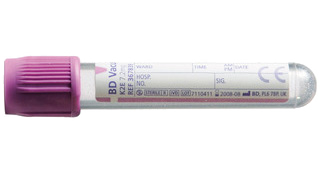Gentechnische informatie
Chromosoom |
17 |  |
Gen |
POMC | |
Mutatie |
14 bp deletie | |
Overerving |
Autosomaal recessief |
Pathofysiologie
POMC (pro-opiomelanocortin) is translated as a pro-protein and a series of bioactive peptides produced by proteolytic cleavage. The deletion disrupts the β-MSH and β-endorphin coding sequences and is associated with higher body weight and body condition score, adiposity, and greater food motivation.
The mechanism by which reduced β-MSH and β-endorphin due to the mutation causes behavioral and weight phenotypes remains to be precisely elucidated. The MSH peptides exert their actions through two closely related G protein-coupled melanocortin receptors. The link between ß-MSH and controlling appetite has already been suggested in man. The role of endorphin is well less understood.
Interpretatiesleutel
| Resultaat | Omschrijving | Interpretatie |
|---|---|---|
| +/+ | homozygoot mutant | De mutatie is aanwezig op beide genen. De hond heeft een sterkere eetlust dan een gemiddelde soortgenoot. Een strikte naleving van de voedingsvoorschriften in functie van leeftijd en activiteitsniveau is noodzakelijk. |
| +/- | heterozygoot mutant | Slechts één van beide genen is defect. Het effect is kleiner dan bij +/+ maar een gepaste voedingsgewoonte naargelang leeftijd en activiteitsniveau blijft het beste advies. |
| -/- | homozygoot wild type | Vrij van de mutatie |
Diersoorten en referenties
Hond
POMC 14bp del
Kenmerken
Afkorting
Obesity POMC
Rubriek
Genetisch onderzoek
Staalname
*

Wisser genetisch

EDTA volbloed
* = voorkeur
Laatst geupdate op 26 september 2025 om 01:02
Referenties
- Davison, LJ, Holder, A, Catchpole, B, O'Callaghan, CA. The Canine POMC Gene, Obesity in Labrador Retrievers and Susceptibility to Diabetes Mellitus. J Vet Intern Med. 2017;31 (2):343-348. doi: 10.1111/jvim.14636. PubMed PMID:28176381 PubMed Central PMC5354034.
- Raffan, E, Dennis, RJ, O'Donovan, CJ, Becker, JM, Scott, RA, Smith, SP et al.. A Deletion in the Canine POMC Gene Is Associated with Weight and Appetite in Obesity-Prone Labrador Retriever Dogs. Cell Metab. 2016;23 (5):893-900. doi: 10.1016/j.cmet.2016.04.012. PubMed PMID:27157046 PubMed Central PMC4873617.
- Wallis, N, Raffan, E. The Genetic Basis of Obesity and Related Metabolic Diseases in Humans and Companion Animals. Genes (Basel). 2020;11 (11):. doi: 10.3390/genes11111378. PubMed PMID:33233816 PubMed Central PMC7699880.
- Jerjen, CP, Kumaran, SJ, Liesegang, A, Hall, E, Wichert, B, Haase, B et al.. Melanocortin-4 receptor and proopiomelanocortin: Candidate genes for obesity in domestic shorthair cats. Anim Genet. 2023;54 (5):637-642. doi: 10.1111/age.13335. PubMed PMID:37365843 .
- Yeo, GSH. Genetics of obesity: can an old dog teach us new tricks?. Diabetologia. 2017;60 (5):778-783. doi: 10.1007/s00125-016-4187-x. PubMed PMID:28013339 PubMed Central PMC6518377.
